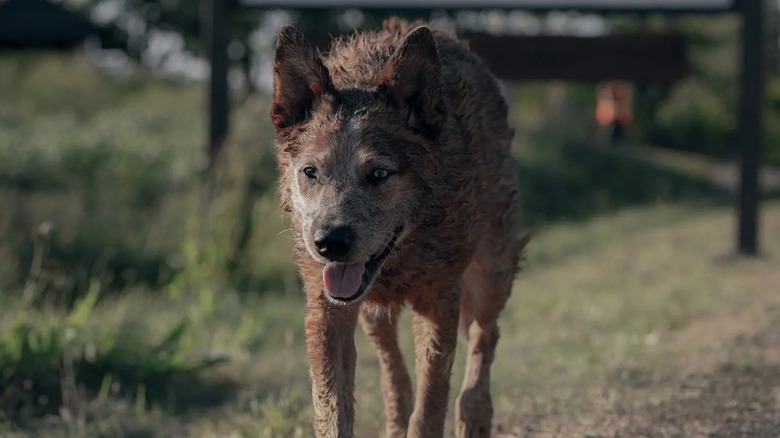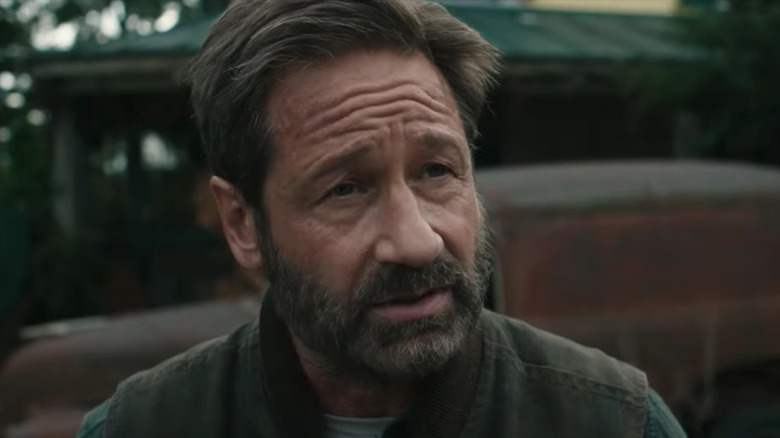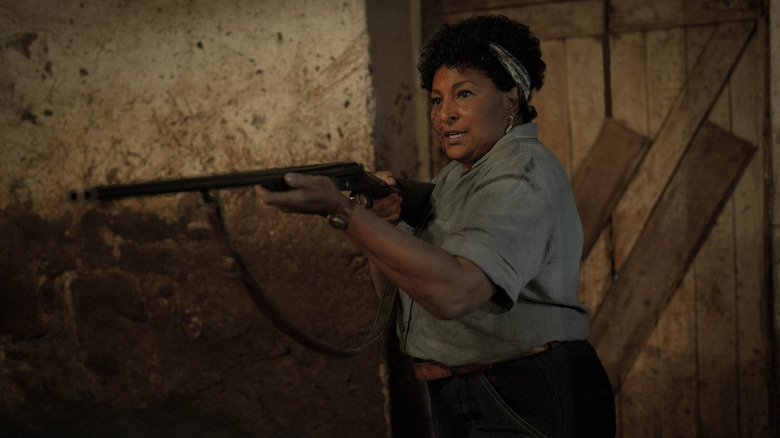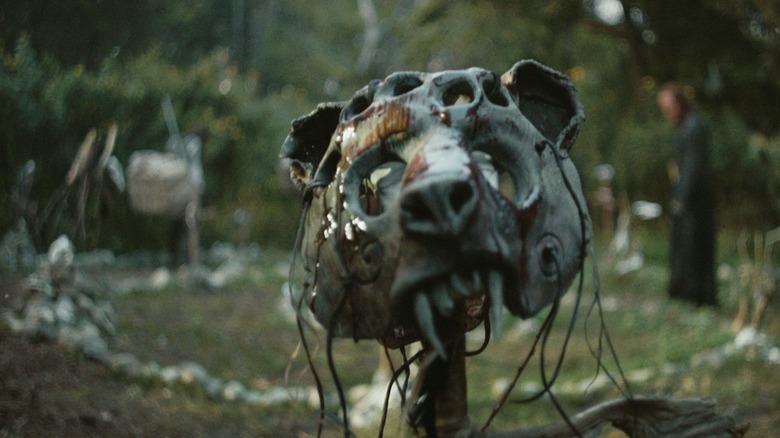How Pet Sematary: Bloodlines' Director Found The Backstory In A Stephen King Classic [Exclusive Interview]
"Pet Sematary: Bloodlines" is a horror prequel with a unique challenge. How do you take one of the most terrifying chapters in Stephen King's scariest book and expand it into an entire film? The chapter in question concerns a young not-quite-dead man named Timmy Baterman and the very-much-alive Jud Crandall, who will one day age into that haunted next door neighbor with some dark wisdom: "Sometimes, dead is better." Told as brisk flashback in the original text, Jud's most upsetting encounter with the cursed land that brings the dead back to life (or rather, something approximating life) is an unsettling moment in a novel defined by unsettling moments. It was only a matter of time before someone expanded it into a full-blown feature film.
That challenge fell to co-writer/director Lindsey Anderson Beer, who has made a film that functions as a prequel to the 2019 adaptation of the novel, but also stands alone as its own story. One can even look at it in tandem with the 1989 adaptation, or even just the original novel. Beer, who dissected the book carefully to find nuggets to inform the prequel, is enough of a fan to know how daunting this task is. And with the film hitting Paramount+, her journey to explore the dark backstory of King's most vicious work can now be shared with horror fans all over the world.
I sat down with Beer following the world premiere of "Pet Sematary: Bloodlines" at Fantastic Fest in Austin, Texas. We talked about digging through King's text to inspire untold backstory, recruiting actors as interesting as David Duchovny and Pam Grier, and yes, who has to clean the zombie dog at the end of a shooting day.
Note: This interview has been lightly edited for clarity and brevity.
'He steals the show in every movie adaptation.'
I think "Pet Sematary" is the scariest book ever written. Where does your history with the book or the film begin?
I read the book around age 9 or 10, which obviously was probably maybe too young. But I saw it on a library shelf and I read it in one night, and it really ignited this passion for Stephen King and horror. And, it remains my favorite King novel to this day. I mean, after that, I started reading everything Stephen King, but there's something so human about it, and I love that it's really like this back door horror story. It's a family drama almost until halfway through, and then it becomes the most terrifying thing ever. But it's because he gives that breathing room to the father story and what it really builds up, what that loss means that it all hits harder.
Jud Crandall in that book is maybe my favorite Stephen King character of all time.
Yeah.
Just a powerfully flawed and relatable guy who's in over his head. Can you talk about Jud Crandall, how you approach him as a character, both as a fan and now as a filmmaker?
Yeah, I mean, I think he certainly steals the book. He steals the show in every movie adaptation. He's such an interesting and enigmatic character and something that I was really intrigued by. When I came on to direct the film, I reread and reread the book over and over again. And something I loved was, at the end of the book, it talks about Jud as guardian of the woods. That suggests a mantle and a mythology that we haven't really explored in film. And I thought that it really gave justification to a lot of the backstory that I ended up creating for this film.
But, I think he's such an interesting character. He clearly is somebody who, when we meet him in the book or in any of the other versions, he's an older man. He seems like somebody who's lost a lot of people in his life. And there's a sweetness but also, I think some people read it as a sinisterness, too. They couldn't quite get a handle on him.
In the book, it says that Timmy Baterman, this chapter and Jud's involvement with Timmy, is actually what made him a target of the evil for his whole life. And it wasn't until he's an older man that the evil is able to infiltrate his head and get to him. So, I wanted to just chart that progression and give a sense of the younger man before he is that jaded, complex older man when he's naive and he just wants to do good in the world and get out of Ludlow and ultimately, that's not his fate.
The Timmy Baterman chapter, that section in the original book, is the "Quint in 'Jaws' speech" of "Pet Sematary." That's the thing that lingers in the back of your head at all times.
Yeah.
Can you talk about how you expand that? I want to know the process, where you said, "Okay, here's what we know for sure and here are the gaps we can fill."
Yeah, it's a constant balance and the Timmy Baterman chapter is very short, but very, I think, impactful. And there's so much there, I think, to draw upon. There were lines in the book about how Timmy knew everybody's darkest secrets in town and he would kind of taunt people in the town. And it was very clear that whatever evil was possessing him was really getting a kick out of f***ing with people in the town.
To me, that was the really interesting kind of starting point, the character — and I say it in a line in the movie, like, "It likes to play with its food, essentially." So I started with what was in the text, and then in terms of expanding it, I just tried to think about a boy in this time and then his friends around him and what they might be dealing with and went from there.
'I just felt like I needed to do my own thing'
And of course, in the original book, he's returning from World War II because of the time shift to allow the remake to exist.
Yeah, exactly.
It's now Vietnam. The Vietnam War is pervasive in this movie. There's a lot of hippie culture, the soundtrack. How did you set out to adjust this?
Yeah. Well, I mean, before I came on, the producers had already decided to make it the sixties to better fit the timeline for their 2019 film. When I was doing my revisions and making the film, I wasn't necessarily thinking about any particular film. I was just thinking about it as a prequel to the book. But I do think that moving up the timeline was very helpful for me thematically, at least. I think that the Vietnam War serves as a much better metaphor for what Jud is facing with the evil. And I also just think it makes it feel more relevant to today because there's such a kind of disillusionment going on in the sixties in terms of our feelings about America.
There was also a really counterculture movement, obviously, as you mentioned with the hippies at the end of the sixties. And I feel like we're kind of in our own version of that right now. But one of the things that I was really excited about in playing with the sixties was taking those what we think of as happy, beautiful things like sunflowers, sunshine, hippie imagery — Donna obviously is more of a hippie character — and then taking that and turning it upside down into something scary.
We've talked a lot about the book already, but this movie also has to serve the 2019 film adaptation. When I interviewed director Mike Flanagan for "Doctor Sleep" a few years ago, he talked about how he wanted to make sure he'd adapted that book, but he also need to make sure it honored Stanley Kubrick's "The Shining," even though the two didn't quite align. Did you want your film to be able to exist just alongside the original book?
I think it's a little bit different for "Doctor Sleep" because there's one definitive "The Shining," but for "Pet Sematary," there's obviously Mary Lambert's version and then there's a 2019 version. So I didn't feel beholden to servicing necessarily either one. They both stand on their own and they're interesting films in their own right and so I just felt like I needed to do my own thing and answer all the questions that I as a fan of the book wanted answered.
I wanted to ask about David Duchovny because he's an actor who you don't see pop up all the time. I feel like he's the kind of guy who, if he wants to take a role, there's got to be a story as to why he took it.
Yeah. Well, obviously he's my first choice, not just because of his history and the genre, but because of his role in "Californication." I felt like he played a father so beautifully, and that was obviously so important to pulling off this role and making sure that he was a nuanced and sympathetic kind of co-conspirator to what ends up being the villain story.
I sent him the script and he just really connected to the grief and the father storyline. He is a father, and we had a meeting and we just had a very immediate meeting of the minds in terms of this character, and he was excited to play somebody that was a little different than other characters he had played before.
And similarly, it's hard to be mad when Pam Grier pops up on a movie screen.
Yeah, that was another dream casting. When I wrote the line, "I killed the Baterman's f***ing dog," I thought, "Oh my god, Pam Greer would be amazing for this." Never did I think that she would actually say yes because it's so rare in movies to have your first choice and that just works out. But we sent her the script, she read it super fast. We hopped on a Zoom because she lives out of state and she had so many ideas for the character already, and she's a big Stephen King fan.
It was her idea that Marjorie is always carrying around jerky and eating beef jerky, and she's had all these little textures that she had figured out in her head and it was clear. She just connected with the character. She lives on a ranch full time. She grew up on a ranch, and I think she really just related to that mentality of Marjorie.
'I just wanted to do something different here'
I have a very stupid question.
Yeah.
I remember someone asking a really good question when the remake came out: "Who cleans the cat every day?" Someone had to make sure that undead cat in the 2019 movie looked so gross, and then clearly someone needed to groom it after the shoot every day. Now, your film has an undead dog. Who cleans the dog?
So the dog has his own special dog trailer, beauty trailer, and had his — Jelly Bean is the hero dog's name and a bunch of wonderful handlers. Yeah, and they would dye and scrub his hair every morning and he would come out looking one way and then by the end of the day, he was all washed off in his little beauty routine trailer just like a normal human actor.
So in the original Timmy Baterman monologue from that chapter, it's very much one bad day, essentially. And in the movie, it becomes a bad week, about three to four days. Can you talk about expanding it, and how it ultimately leads into a much bigger action scene?
Yeah, I mean that's always our challenge as creatives, right, is just the imagining. And for me, it was really important to make this Jud's war. So to me, it couldn't just be a short thing. It needed to be something that maybe emulated a little bit more the experience of going to war between intense action scenes, stalking scenes, hiding, and I wanted it to be an experience for viewers. So it's not something that they had seen before. We've all been in horror movies that contained haunted house horrors, and I just wanted to do something different here.
Is there a scene or moment that you're particularly proud of in the final film?
Yeah, a couple scenes. The sunflower scene with the running through the sunflowers, and also the dance scene I love so much because I think it really encapsulates Manny and Donna's relationship when they're sitting there and they have this moment of kind of sibling bonding before kind of really sweetly dancing with each other and then obviously s*** turns sideways.
But to me, I think that encapsulates what I was trying to go for. That scene kind of encompasses everything I was trying to go for in this movie, which is that spirit of the King book where it's not just horror, it's also drama, it's family pathos, it's personal struggle and being able to make the horror all the scarier because you're invested in the characters.
I'm always fond of period horror. Once something takes place before 1980, I'm already hooked. So the '60s was one thing, but then the movie has a flashback to the 1700s. It's a little movie within the movie.
Yeah, I loved filming that sequence and I shot so much stuff, we could make its own prequel to the prequel with that stuff. But I just thought it was so important to show the founding of Ludlow and what happened there. Because it's one thing to hear about it, and it's another thing to see it and really feel the weight of that history and how long this evil has been there and kind of what the origin is for at least the white colonial settlers versus the tribe that was there. But it was a blast to shoot that and the forest that we shot in was just amazing. It was an amazing place to shoot.
It's about time that a "Pet Sematary" story brought in indigenous characters. I love the book, but it's always been a horror story written by a white man built around Native American "magic."
Exactly. Exactly. And that was really important to me. And something I said from the start, when I took on the project, I said, "If I'm going to do this, it's important to me to subvert the notion of the mystical indigenous and the cursed Native American land and say that this is something that's always existed," and also give a point of view to the Native Americans in the story, and Donna and Manny to me, other than Manny and Jud, are very much the heart of the movie and are so important to giving perspective.
Is there a Stephen King story or book that you have your eye on next? If someone cut you a check and said, "Do what you want," is there one you'd pick?
I don't know. I'd really have to think about it. "Pet Sematary" was my favorite, and that was always the thing in my head and it's been my life 20 hours a day for the last three years, so I can't even think about it yet. But I love Stephen King. I would be honored to play in any sandbox.
"Pet Sematary: Bloodlines" is now streaming on Paramount+.



